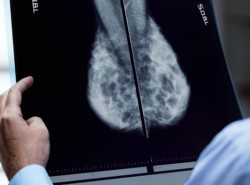
Identifying genetic risk factors and new treatments for young breast cancer patients
Published: 04/30/24 8:23 AM

Professor Ian Campbell
Project Description:
Early-onset breast cancers, often defined as breast cancer occurring in women aged 18-45 years, account for about 7% of all new female breast cancer cases and approximately 15% of breast cancer deaths. Among early-onset breast cancers are a substantial proportion where the breast cancer diagnosis occurs during or within one year after pregnancy, called pregnancy associated breast cancer. Treatment for women with a pregnancy associated breast cancer is often delayed because of fears of the effects to the baby. In this study, Prof Ian Campbell and colleagues will use the latest whole genome sequencing technologies to analyse a large cohort of early-onset and pregnancy associated breast cancers. This information will be integrated with patients’ clinical data to discover new genes that contribute to an increased risk of early-onset breast cancers.
Why is this work needed:
The prognosis for women diagnosed with breast cancer below the age of 45 years can be poor. Despite the discovery of inherited breast cancer risk genes in many breast cancer types, genetic information about early-onset breast cancer is lacking. Identification of the cause of early-onset breast cancer can lead to improved prevention and breast cancer treatment. This will especially be beneficial for women at risk of developing breast cancer during pregnancy where women often delay treatment to preserve the baby’s health.
Expected outcomes:
Successful outcomes of this study will reveal new genetic factors that are particularly prevalent in early-onset breast cancers and pregnancy associated breast cancers. This information will be valuable for improving genetic testing to identify women at risk of breast cancer to improve risk management and uncover potential new therapeutic targets.
Project description:
Early-onset breast cancers, often defined as breast cancer occurring in women aged 18-45 years, account for about 7% of all new female breast cancer cases and approximately 15% of breast cancer deaths. Among early-onset breast cancers are a substantial proportion where the breast cancer diagnosis occurs during or within one year after pregnancy, called pregnancy associated breast cancer. To protect the baby, treatment for women with a pregnancy associated breast cancer is often delayed.
Prior research led by Prof Ian Campbell at the Peter MacCallum Cancer Centre revealed that individuals with early-onset breast cancer represent a different biological group and their cancers are not just typical breast cancers but are driven by unique genetic factors.
With NBCF support, Prof Ian Campbell and colleagues will use the latest whole genome sequencing technologies to analyse a large cohort of early-onset and pregnancy associated breast cancers. This information will be integrated with patients’ clinical data to discover new genes that contribute to an increased risk of early onset breast cancer.
This information will be valuable for improving genetic testing to identify young women at risk of breast cancer to improve risk management and uncover potential new therapeutic targets.